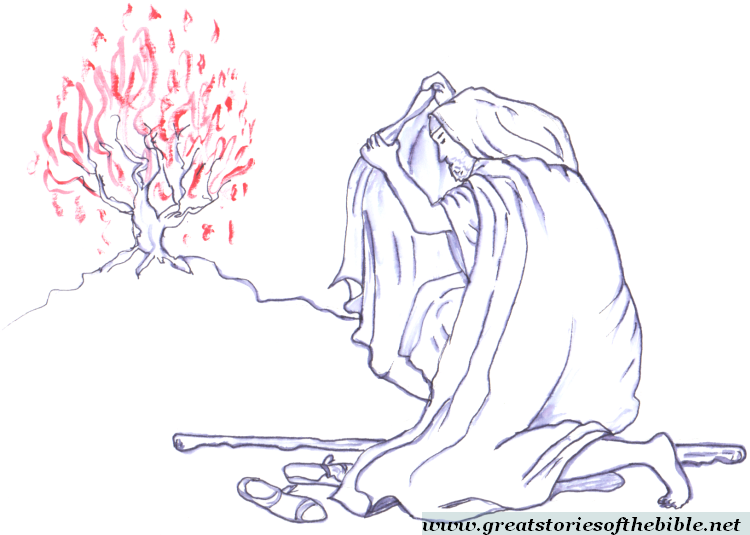Moses - episode 2
Do not send me!
We continue Moses’ story from the call on Mount Horeb (Exodus 3 and following), which begins the last forty years of his life, the years dedicated to the mission. When God chooses a prophet to give him a message, He always finds bewilderment and fear for a task that is considered too big for human forces. No one, however, protests as many times as Moses: five objections, despite the Lord’s repeated assurances. That confirms the truth and the uniqueness of his call. To the Hebrews, in fact, he is the greatest of God’s prophets and his mission is the most important: to make a consecrated and holy people out of a set of quarrelsome tribes. Here are his objections and the Lord’s answers in detail:
«“[…] Come now therefore, and I will send you to Pharaoh, that you may bring forth my people, the children of Israel, out of Egypt.” Moses said to God, “Who am I, that I should go to Pharaoh, and that I should bring forth the children of Israel out of Egypt?” He said, “Certainly I will be with you. This will be the token to you, that I have sent you: when you have brought forth the people out of Egypt, you shall serve God on this mountain.”». Moses receives his deepest identity: he will be God’s presence for the people; the sign of confirmation is strange because it concerns the future, it is not immediate. It requires of Moses the pure faith, counting only on his call at the burning bush.

«Moses said to God, “Behold, when I come to the children of Israel, and tell them, ‘The God of your fathers has sent me to you;’ and they ask me, ‘What is his name?’ What should I tell them?” God said to Moses, “I AM THAT I AM,” and he said, “You shall tell the children of Israel this: ‘I AM has sent me to you.’“God said moreover to Moses, “You shall tell the children of Israel this, ‘The LORD, the God of your fathers, the God of Abraham, the God of Isaac, and the God of Jacob, has sent me to you.’ This is my name forever, and this is my memorial to all generations […]”». The Lord reveals himself to Moses with a name that says and does not say, which also contains an ineffable promise of blessing: it can also be translated as “I will be who I will be”, referring to the future of wonders and prodigies that will show God’s care for his people.
«Moses answered, “But, behold, they will not believe me, nor listen to my voice; for they will say, ‘The LORD has not appeared to you.’” The LORD said to him, “What is that in your hand?” He said, “A rod.” He said, “Throw it on the ground.” He threw it on the ground, and it became a serpent; and Moses ran away from it. The LORD said to Moses, “Put forth your hand, and take it by the tail.” He put forth his hand, and laid hold of it, and it became a rod in his hand. “That they may believe that the LORD, the God of their fathers, the God of Abraham, the God of Isaac, and the God of Jacob, has appeared to you.” The LORD said furthermore to him, “Now put your hand inside your cloak.” He put his hand inside his cloak, and when he took it out, behold, his hand was leprous, as white as snow. He said, “Put your hand inside your cloak again.” He put his hand inside his cloak again, and when he took it out of his cloak, behold, it had turned again as his other flesh». The hand inside the cloak symbolically reminds Moses that he should give up relying on his own initiative and energy, but he will only count on God’s power (the rod).
«Moses said to the LORD, “Oh, Lord, I am not eloquent, neither before now, nor since you have spoken to your servant; for I am slow of speech, and of a slow tongue.” The LORD said to him, “Who made man’s mouth? Or who makes one mute, or deaf, or seeing, or blind? Isn’t it I, the LORD? Now therefore go, and I will be with your mouth, and teach you what you shall speak.”». The Lord does not disprove his paradoxical election criteria: as man of the Word (prophet) he chooses a person “heavy” of mouth and tongue (perhaps stutterer?). We can remember Abraham and Sarah: the divine promise of descendants as numerous as the sand of the sea ... to a barren couple of seniors. Again the text tells that what will make the difference is God’s power, not a human initiative.
«He said, “Oh, Lord, please send someone else.” The anger of the LORD was kindled against Moses, and he said, “What about Aaron, your brother, the Levite? I know that he can speak well. Also, behold, he comes forth to meet you. When he sees you, he will be glad in his heart. You shall speak to him, and put the words in his mouth. I will be with your mouth, and with his mouth, and will teach you what you shall do. He will be your spokesman to the people; and it will happen, that he will be to you a mouth, and you will be to him as God. You shall take this rod in your hand, with which you shall do the signs.”». The last objection is the most radical: send whomever you want, but not me! Moses now has just to accept, trusting in God and his Word. In the next post we will continue the story with the meeting between Moses and the Pharaoh.